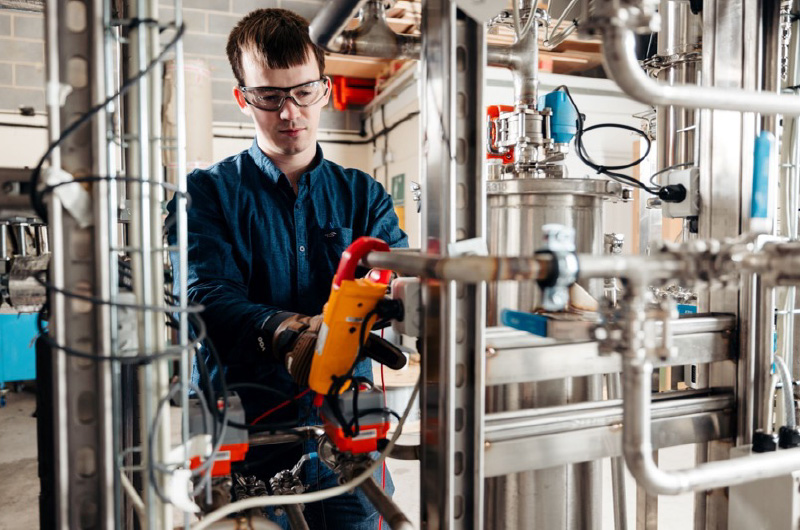Leeds based C-Capture, a spin-out company from the School of Chemistry at the University of Leeds and developers of world-leading chemical processes for carbon dioxide removal, has secured £1.7m in funding from the BEIS £1 billion Net Zero Innovation Portfolio (NZIP).
The funding is part of the £20 million Carbon Capture, Usage and Storage (CCUS) Innovation 2.0 programme aimed at accelerating the deployment of next-generation CCUS technology in the UK.
C-Capture will use the funding to finance a major, national £2.7m project as a critical step in the race to net zero.
The multi-industry, multi-million-pound project will see C-Capture’s unique, next-generation carbon capture technology deployed on numerous sites across the country, within industries that are particularly difficult to decarbonise. Demonstrating that a low-cost, carbon capture technology is a credible solution in the fight against climate change.
The compatibility of C-Capture’s unique, solvent-based technology will be trialled and assessed with real-world flue gas across three hard-to-abate sectors – at sites owned by project partners Hanson Cement, part of the Heidelberg Group, Bioenergy Infrastructure Group (BIG), Glass Futures and one of their member sites Pilkington UK Ltd – in conjunction with leading consulting and engineering company, Wood.
The project ‘XLR8 CCS – accelerating the deployment of a low-cost carbon capture solution for hard-to- abate industries’ will deliver feasibility studies and deploy carbon capture solvent compatibility units (CCSCUs) across the cement and Energy from Waste (EfW) and – in a world first – the glass industry.
Glass and cement industries are essential to the economy but also major carbon dioxide (CO2)contributors. Concrete is the most consumed material by weight globally after water and one of its key ingredients is cement. The cement industry is valued at approximately £1bn and produces approximately 7.5 million tonnes of CO2 in the UK each year. The UK’s glass industry contributes around £2bn every year to the economy and emits over 2 million tonnes of CO2 annually in the UK. EfW plants offer a solution to residual waste, whilst helping to meet the demand for low-carbon energy by converting waste that would otherwise be sent to landfill, into power for homes. Incorporating carbon capture into the process could further lower emissions of the sector and, in cases where waste wood material is used as fuel, allow it to become negative emissions.
All three of these industries are also particularly challenging to decarbonise due to the level and type of impurities in their flue gas emissions. The success of the XLR8 CCS project will benefit UK industry by making a credible, low-cost technology a reality in the route to decarbonisation within these sectors.
CCUS has been identified as an essential component in the route to decarbonisation but barriers to adopting CCUS technology currently exist – such as technology maturity, flue gas compatibility in multiple industries, and cost. XLR8 CCS aims to alleviate these barriers, demonstrating the robust performance of C-Capture’s innovative technology in removing CO2 within hard-to-abate industries. The project will demonstrate that a credible, low-cost carbon capture solution is a reality for difficult-to-decarbonise industries in the race to net zero.



